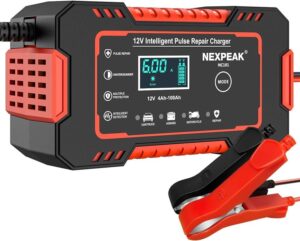Do you charge a new car battery before use? The short answer is yes. It’s important to give your new car battery a proper charge before putting it to work. Why? Well, think of it like fueling up your vehicle before hitting the road. Just like a full tank of gas ensures a smooth journey, a fully charged battery sets the stage for optimal performance. In this article, we’ll delve into why charging a new car battery is essential and share some tips on how to do it effectively. So, let’s get started, shall we?
Do You Charge a New Car Battery Before Use?
When it comes to purchasing a new car battery, one question that often arises is whether it needs to be charged before use. The answer to this question can vary depending on the type of battery and the manufacturer’s recommendations. In this article, we will explore the topic of whether you should charge a new car battery before use, addressing pertinent subtopics and providing you with the information you need to make an informed decision.
Freshness of the Battery
One important factor to consider when deciding whether to charge a new car battery before use is the freshness of the battery itself. Car batteries typically have a date stamp that indicates when they were manufactured. If you have purchased a battery that has been sitting on the shelf for an extended period, it is possible that its charge may have depleted over time. In such cases, charging the battery before use is recommended to ensure optimal performance.
Manufacturer’s Recommendations
To determine whether to charge a new car battery before use, it is crucial to consult the manufacturer’s recommendations. Each battery manufacturer may have specific guidelines on how their batteries should be handled. Some manufacturers may advise charging the battery before use, while others may state that their batteries come pre-charged and ready for installation. Checking the manufacturer’s instructions or contacting their customer support can provide valuable insights into the proper handling of the battery.
Sealed Lead-Acid Batteries
Sealed lead-acid batteries are a common type of battery used in vehicles. These batteries are typically maintenance-free and come fully charged from the factory. Therefore, a new sealed lead-acid battery generally does not need to be charged before use. However, it is essential to ensure that the battery voltage matches the requirements of your vehicle before installation.
Deep Cycle Batteries
Deep cycle batteries, often used in recreational vehicles and boats, have a unique charging requirement. These batteries are designed to be discharged deeply and then recharged. While deep cycle batteries may come partially charged or at a lower voltage, it is still advisable to charge them fully before their initial use. This helps condition the battery and prolong its lifespan.
Lithium-Ion Batteries
Lithium-ion batteries have become increasingly popular in recent years due to their higher energy density and longer lifespan. These batteries are commonly used in electric vehicles. Unlike traditional lead-acid batteries, lithium-ion batteries come pre-charged and ready for use. Therefore, charging a new lithium-ion car battery before installation is generally unnecessary.
Benefits of Charging a New Car Battery Before Use
While many car batteries come pre-charged and ready for installation, there are benefits to charging a new car battery before use, regardless of the type.
- Optimal Performance: Charging a new car battery ensures that it reaches its maximum charge capacity, allowing it to deliver optimal performance.
- Battery Conditioning: The initial charging process helps condition the battery, ensuring its cells are balanced and ready for use.
- Peace of Mind: Charging the battery before installation provides peace of mind, knowing that the battery is fully charged and ready to power your vehicle.
Charging a New Car Battery
If you decide to charge a new car battery before use, it is essential to follow proper charging procedures to avoid any damage or safety hazards. Here are the general steps to charge a new car battery:
- Choose a Charging Method: You can charge a car battery using a dedicated battery charger or by using your vehicle’s alternator. Using a battery charger is usually recommended as it provides more control over the charging process.
- Prepare the Battery: Ensure the battery terminals are clean, and the battery is in a well-ventilated area. Remove any protective caps or covers if present.
- Connect the Charger: Attach the positive (+) charger clamp to the positive terminal of the battery and the negative (-) charger clamp to the negative terminal. Ensure a secure connection.
- Select the Charging Mode: Set the charger to the appropriate charging mode based on the battery type (e.g., normal, AGM, gel, etc.) and the charger’s instructions.
- Start the Charging Process: Turn on the charger and let it charge the battery according to the recommended charging time. Avoid overcharging the battery, as it can lead to damage.
- Monitor the Charging Process: Keep an eye on the charger and battery during the charging process. If you notice any unusual sounds or excessive heat, stop the charging immediately and consult the manufacturer’s instructions or a professional.
- Complete the Charging Process: Once the battery is fully charged, turn off the charger and disconnect the charger clamps in the reverse order of their connection (negative clamp first, then positive).
While whether to charge a new car battery before use depends on various factors, including the battery type and manufacturer’s recommendations, it is generally a good practice to charge the battery before installation. Charging ensures optimal performance, conditions the battery, and provides peace of mind. Always refer to the manufacturer’s instructions to determine the specific requirements for your new car battery. By following the proper charging procedures, you can maximize the lifespan and reliability of your car battery, ensuring a smooth driving experience.
Frequently Asked Questions
Should I charge a new car battery before use?
Yes, it is recommended to charge a new car battery before use. Although some batteries may come partially charged from the manufacturer, it is always a good idea to fully charge it before installing it in your vehicle.
Why is it important to charge a new car battery?
Charging a new car battery ensures that it reaches its optimal performance level. It helps to activate the battery’s chemical components and balance the charge across its cells. This process enhances the battery’s lifespan and overall performance.
How long should I charge a new car battery before using it?
The charging time for a new car battery can vary depending on its type and capacity. Generally, it is recommended to charge the battery for at least 4 to 12 hours. However, it is important to follow the instructions provided by the battery manufacturer for the specific charging time.
Can I install a new car battery without charging it?
While it is technically possible to install a new car battery without charging it, it is not recommended. Without a full charge, the battery may not perform optimally and may have a shorter lifespan. Charging the battery before use ensures that it is ready to provide reliable power to your vehicle.
What charging method should I use for a new car battery?
The ideal charging method for a new car battery is using a compatible battery charger. This ensures a controlled and safe charging process. Avoid using a charger with a high amperage output, as it can damage the battery. It is also important to follow the manufacturer’s instructions for the specific charger you are using.
Can I use my vehicle’s alternator to charge a new car battery?
While the vehicle’s alternator can charge a car battery, it is not recommended as the primary charging method for a new battery. The alternator is designed to maintain the battery’s charge rather than fully charge it. Additionally, using the alternator alone may result in an incomplete charge and shorter battery life.
Final Thoughts
Charging a new car battery before use is not necessary in most cases. Modern car batteries come pre-charged from the manufacturer, allowing you to install them immediately. However, it is recommended to check the battery voltage and charge level before installation, ensuring it meets the required specifications. If the battery is not fully charged, a short initial charge may be needed. Remember to follow the specific instructions provided by the battery manufacturer. Ultimately, the decision to charge a new car battery before use depends on its initial charge level and the specific guidelines provided by the manufacturer.



